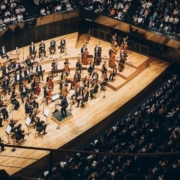Concert ‘Hollywood Rhapsody’ in Paris [SUMMARY]
On Wednesday, November 13th, the Orchestre de Paris conducted by John Wilson presented the concert ‘Hollywood Rhapsody’ at the Philharmonie de Paris.
Our friend and collaborator Benoit Daldin was there and offers us this exclusive article for SoundTrackFest.
Hollywood in Paris
There are concerts that should be welcome not only for their artistic qualities but also, and above all, for the symbolism they convey. On Wednesday, November 13, the Orchestre de Paris, one of the best orchestras in Europe, presented a sublime program dedicated to the music of the Golden Age of Hollywood. It was an ideal program devised by conductor John Wilson, whose experience in this field has been amply demonstrated.
The fact that one of France’s finest orchestras is daring to venture into a repertoire it had hitherto explored very little, if at all, is an excellent sign of the growing importance of film music in French symphony seasons. The triumphant reception by a packed hall and an audience clearly different from that of “classical” symphony concerts suggests the potential of this type of program. The Orchestre de Paris will also return to film music with a program of music by Alexandre Desplat, conducted by the composer at the end of January 2025 (read more).
The arrival of the talkies was a musical revolution in Hollywood, and the producers of the time turned to the greatest composers present at the time in Los Angeles, including musicians in exile after the political upheavals in Europe at the time. Their names were Korngold, Steiner, Waxman, Rosza, Newman, Tiomkin, Raskin, North and Herrmann, and they shaped the sound of Hollywood for more than 30 years.
Such a concert could only open with Alfred Newman’s Fox Fanfare and the opening credits of Korngold’s “King’s Row,” one of the perfect examples of the Hollywood sound. In his address to the audience, John Wilson aptly reminds us that Korngold’s music does not sound like film music, as is sometimes said: Hollywood film music was simply invented by him and his colleagues. It is hard not to follow with John Williams’ “Star Wars” theme music, the ideal heir to that golden age that he resurrected most beautifully in music for George Lucas’ saga, with an obvious homage to “King’s Row”.
It is followed by David Raskin’s gentle score for Otto Preminger’s “Laura” and then Bernard Herrmann’s sharp strings for Hitchcock’s “Psycho” and its famous shower scene, which is still shocking. The first part ends with the suite from Korngold’s “The Adventures of Robin Hood”: the height of luxury!
Exploring the Golden Age of Hollywood without including westerns would have been a lapse in taste, but fortunately we rediscover Jérôme Moross’s “The Big Country,” a classic of the genre with Aaron Copland accents. Next, two timeless classics: “Gone with the Wind” by the great Max Steiner, the other father of film music, and Franz Waxman’s “A Place in the Sun,” with its irresistible saxophone solo and a theme that fans of the French program “Cinéma Cinémas” will easily recognize.
The surprise of the evening: a medley devised by John Wilson and Peter Moris based on the music composed by Scott Bradley for seven “Tom & Jerry” short films. No pictures are needed here: the percussionists recreate the frantic chase between the hapless cat and the mischievous mouse with broken cymbals, reed flutes, and barking. The audience laughed out loud, but also admired the music, which was much more subtle than it seemed, full of color and references. Miklos Rozsa’s music was the last piece on the program. A regular collaborator of Billy Wilder and Fritz Lang, his “Ben-Hur” is one of the most emblematic peplum scores, with the Parade preceding the famous chariot race.
As an encore, a masterpiece of orchestration, a thrilling firework: the theme from Franz Waxman’s “Taras Bulba”, which unleashes thunderous applause from the audience.
When can we expect more? Such a rich and vast repertoire deserves many concerts like this one.
Article by Benoit Daldin









